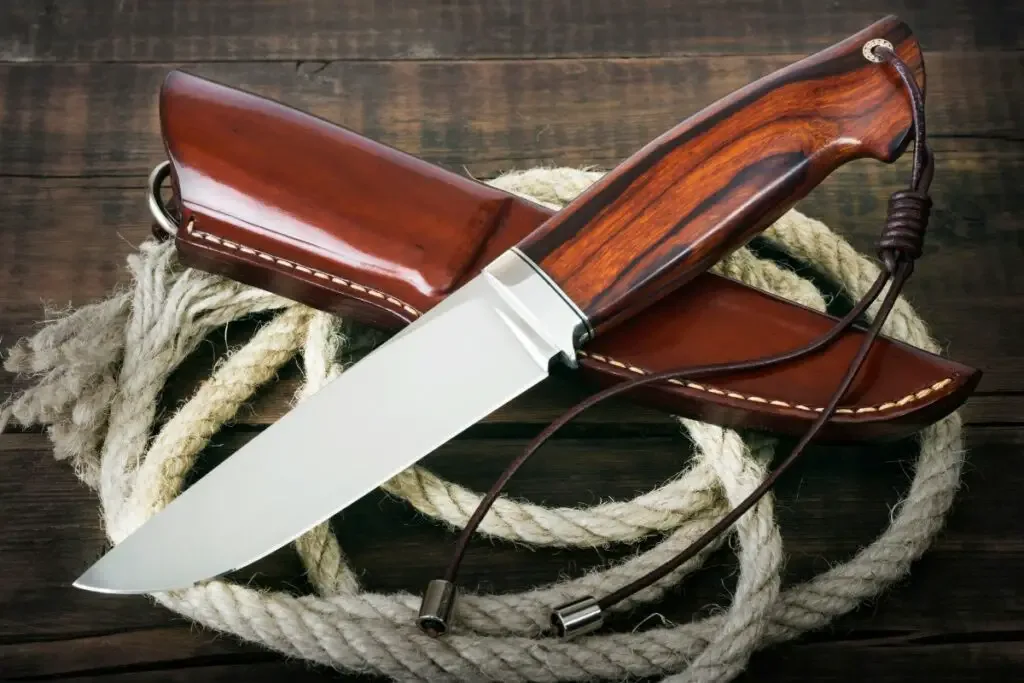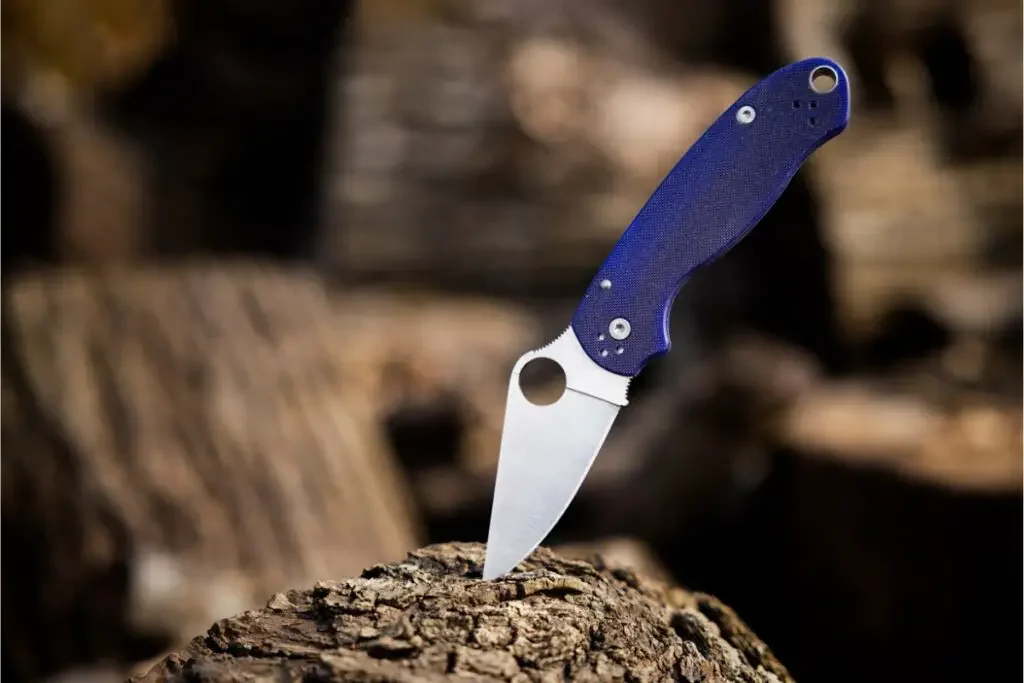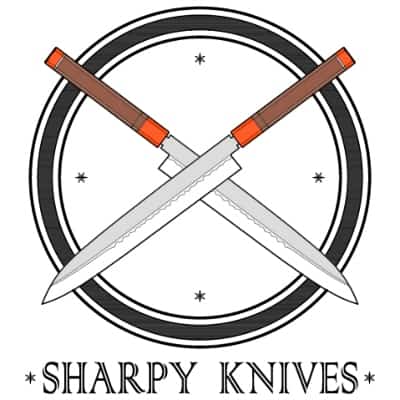As an Amazon Associate, we earn from qualifying purchases with no additional costs for you.
Steel type is an important aspect of the manufacture of quality, durable knives. If you are interested in knives, at some point, you are going to learn about steels and the qualities that they impart to the knives that are produced from them. Often, the big question is to go high carbon steel or stainless steel. Elmax and Maxamet steels fall into these categories, so what are the major differences between these two plates of steel?
Elmax is a modern stainless steel alloy that is popular for knife making because it combines corrosion and wears resistance with carbon steel-like edge retention. Maxamet is a high carbon super-steel that is very hard due to its high Tungsten content which makes for great edge retention.
Elmax steel is stainless steel, and Maxamet steel is high carbon steel, which makes them the ideal knife steels to compare against each other.
Some knife enthusiasts prefer high carbon steels, while others prefer stainless steels because of the properties that each steel type offers, but Elmax is stainless steel with a twist. Take a look at these two plates of steel before you order your next knife; you may want to try something different.
If you are interested in buying the best knife we recommend checking out Enzo knife with elmax steel (Amazon link) and Spyderco knife with maxamet steel (Amazon link).

Elmax Vs. Maxamet Steel
There has always been debate in knife communities about which is the better steel composition for making knives. The one thing that many knife enthusiasts are more likely to agree on is that some steels are good for certain knives but not good for all knife types.
High carbon steel is normally seen as the realm of bushcraft or survival knife type steel, while stainless steel is generally seen as steel for kitchen cutlery.
Typically, there are exceptions to most of these generalizations, such as Japanese kitchen knives that are made from high carbon steel and outdoor knives that are made from stainless steel.
Before deciding what steel is best for your knife needs, you need to understand a little about the characteristics of each steel and what benefits each steel brings to the knife.
What Is Elmax Steel?
Elmax is stainless steel that is produced by the Austrian company Bohler-Uddeholm who are manufacturers of high-quality steels.
Chromium is the component in the steel that makes it stainless, and in order for a manufacturer to label its steel as stainless, it must have a minimum chromium content of 12%. Elmax steel exceeds this minimum with a Chromium content of 18%.
Elmax steels include high levels of molybdenum and vanadium, which, when combined with the chromium, offer excellent corrosion and wear resistance.
Elmax is stainless steel with a twist because it is unusual among stainless steel in that it also exhibits qualities of high carbon steel.
This combination of stainless steel qualities with carbon steel characteristics is making Elmax popular steel among knife makers and knife users alike and gaining a reputation for being one of the best knife steels around.
The manufacturer describes Elmax steel as super-clean steel, which means that the steel is free from contaminants, and the alloys are mixed evenly throughout the composite structure of the final product.
The way they get this right is with the concept of powder metallurgy, where the metals are converted into powder by spraying the liquid metal with pressurized nitrogen. The metal “powder” then goes into capsules where it is melted together.
TIP: Elmax steel is quite popular among knife makers. So you could be interested in how hard is to sharpen a knife with elmax steel. Find out the answer in the article below:
Is Elmax Hard To Sharpen? All You Need to Know
How Tough is Elmax Steel?
Because of the modern methods of creating this type of stainless steel, it is possible to make stainless steel that exhibits the corrosion, stain, and wear resistance of stainless steel but also has the characteristic toughness of high carbon steel.
Elmax stainless steel is considered to be twice as tough as stainless steel that is manufactured using other processes, which normally results in softer stainless steel.
This makes Elmax steel tougher stainless steel that will hold up to the extremes demanded from a knife in the kitchen or batoning firewood in the wilderness.
Does Elmax Steel Retain An Edge Well?

The unique combinations of the alloys and the process of manufacture allow Elmax steel to be hardened to a level above 60HRC, which is normally only possible for high carbon steels such as those used in Japanese kitchen knives.
This is a significant achievement since most other stainless steel can normally only be hardened to a maximum of 58 or 59HRC
This makes Elmax steel excellent for edge retention, but it does mean that the edge exhibits characteristics closer to high carbon steel in that it can chip easier than with knives made from other stainless steel types.
Our choice: If you are interested in buying the knife with Elmax steel we use and recommend Enzo Trapper 115 Fixed Blade Elmax (Amazon link). This knife is built well and it is good for all outdoor activities.
What Is Maxamet Steel?
Maxamet is not considered to be stainless steel, even though it exhibits better corrosion and wear resistance than traditional high carbon steel.
Maxamet is an alloy steel that is produced using the powder metallurgy process by a USA company called Carpenter Technology Corporation that operates out of Philadelphia.
Just like Elmax steel is a new generation stainless steel, Maxamet is a new generation high carbon steel.
What makes Maxamet steel different from other high carbon steels is the inclusion of high levels of Tungsten, Vanadium, and Carbon in the alloy. This has resulted in Maxamet being classified as one of the modern super-steels.
TIP: Elmax and maxamet are really hard and high-quality steels that are not easy to sharpen. Shapton makes whetstones that can sharpen even the hardest steels! Do you know the difference between Shapton Kuromaku and Glass stones? Click on the article below!
Shapton Kuromaku Vs. Glass Stone: What Works Best?
Is Maxamet Steel Tough?
Maxamet is considered to be one of the toughest steels available for knife making. The inclusion of Tungsten in the alloy produces an extremely hard, tough, and wear-resistant steel.
The steel has a very low Chromium content of only 4%, which does make it susceptible to corrosion and rust, but taking good care of the knife as required for any high carbon steel knife will prevent rust on your Maxamet steel knife.
The toughness of Maxamet steel has resulted in many knife manufacturers producing knives from this steel for use in the kitchen, hobbies, or for outdoor wilderness-style use.
Does Maxamet Steel Hold An Edge?

Maxamet steel is considered to have one of the best edge retention characteristics of most modern knife-making steels.
Maxamet steel can be hardened to 70HRC, which makes for an extremely hard, tough edge, largely due to the high tungsten component in the steel.
Knives made from Maxamet steel hold their edge very well, but because of the hardness and toughness of the steel, they are notoriously difficult to sharpen. The benefit of their excellent edge retention, however, means that you would have to sharpen the knives less frequently.
Our choice: If you are interested in buying the knife with Maxamet steel we use and recommend Spyderco Para 3 Maxamet Signature Folding Knife (Amazon link). Spyderco is a well-known knife producer from the United States that produces one of the best pocket and folding knives made with Maxamet steel.
Which Is The Best Knife Steel For You? Elmax or Maxamet Steel?
When it comes down to making a choice between these steels as to which one is the best for you, you will need to take into account your unique requirements.
If you are using a knife in hot, humid conditions or where the knife will be constantly exposed to corrosive conditions, such as saltwater or acidic substances, then your best choice may be a stainless steel knife.
A knife made from Elmax steel would be a great choice because it gives the benefits of stainless steel but the edge retention and toughness that is normally more typical of high carbon steel.
A testament to the durability of Elmax stainless steel is that it is often used to create knives for military use in harsh environments, such as combat knives for the Navy Seals.
If you do not normally subject a knife the damp or corrosive environments, but you are in need of a hard-wearing tough knife that holds an edge better than most, then high carbon steel such as Matamet would be a good choice.
You would need to be prepared to put more work into the maintenance and care of your Matamex steel knife, but you will be rewarded with an extremely tough knife that holds an edge for a long time under difficult conditions.
Comparison Table: Elmax Vs. Maxamet Steel Knives
The table below provides a side-by-side comparison of the key characteristics of Elmax and Maxamet steel knives as a quick reference guide to help you make an informed decision based on your specific needs and preferences.
| Characteristics | Elmax Steel | Maxamet Steel |
| Type of Steel | Stainless Steel | High Carbon Steel |
| Corrosion Resistance | High (due to 18% Chromium content) | Moderate (lower Chromium content of 4%) |
| Edge Retention | Excellent | Superior (due to high Tungsten content) |
| Hardness | Up to 60-62 HRC | Up to 70 HRC |
| Wear Resistance | High | Extremely High |
| Sharpening Difficulty | Moderate (harder than some steels) | High (notoriously difficult due to hardness) |
| Toughness | High (combines qualities of stainless and carbon steel) | Very High (enhanced by Tungsten) |
| Cost | Premium (due to quality and manufacturing process) | Premium (considered a modern super-steel) |
| Manufacturing Process | Powder Metallurgy | Powder Metallurgy |
| Popular Uses | Kitchen knives, outdoor knives, military knives | Kitchen knives, pocket/folding knives, outdoor knives |
| Maintenance | Regular care to maintain edge sharpness | Requires more frequent care to prevent corrosion |
FAQs About Elmax And Maxamet Steel Knives
1. Why is Elmax steel considered a premium choice for knife blades? Elmax steel is a high-chromium vanadium molybdenum alloyed steel, known for its excellent combination of wear resistance, corrosion resistance, and ability to retain a sharp edge. Its balanced properties make it a preferred choice for premium knives.
2. How do I maintain my Elmax steel knife to ensure its longevity? To maintain an Elmax steel knife, it’s essential to clean and dry the blade after each use, especially if exposed to acidic or salty substances. Regular sharpening using suitable tools will ensure the blade remains sharp. Storing the knife in a dry place or using a protective sheath can also help prolong its life.
3. Can Elmax steel knives be used for outdoor activities like camping or hunting? Yes, Elmax steel knives are versatile and can be used for various activities, including camping and hunting. Their excellent edge retention and corrosion resistance make them suitable for outdoor conditions.
4. What makes Maxamet steel stand out from other knife steels? Maxamet steel is known for its incredibly high hardness, reaching up to 70 HRC. This makes it one of the hardest knife steels available. Additionally, its high tungsten content enhances its wear resistance, making it a modern super-steel in the knife industry.
5. Are Maxamet steel knives prone to rusting? While Maxamet steel offers excellent wear resistance, it has a moderate level of corrosion resistance due to its lower chromium content. It’s essential to keep Maxamet steel knives dry and clean, especially in humid environments, to prevent rusting.
6. Is it challenging to sharpen a Maxamet steel knife? Due to its extreme hardness, Maxamet steel can be more challenging to sharpen compared to other steels. It’s recommended to use specialized sharpening tools, like diamond sharpeners, to achieve the desired sharpness.
Conclusion
It is sometimes difficult to make a choice between knives made of different steels, especially if both will work for your application.
The choice is easier if you have specific needs that place specific demands on a knife which will make your choice clear-cut and obvious.
Most knife enthusiasts own more than one knife, and if you consider yourself in this category, why not try a knife that is made from each of the steels to get a feel of how each steel type holds up to your particular needs?
This is the strategy I prefer, and it gives me an excuse to get one more knife! For research purposes, of course, which is what I tell people who view my knife habit with a judgemental eye!
TIP: Did you know that some knives have holes in the handle? If you want to know what these holes are for, click on the article below!
6 Reasons Why (Some) Knives Have Holes In The Handle
